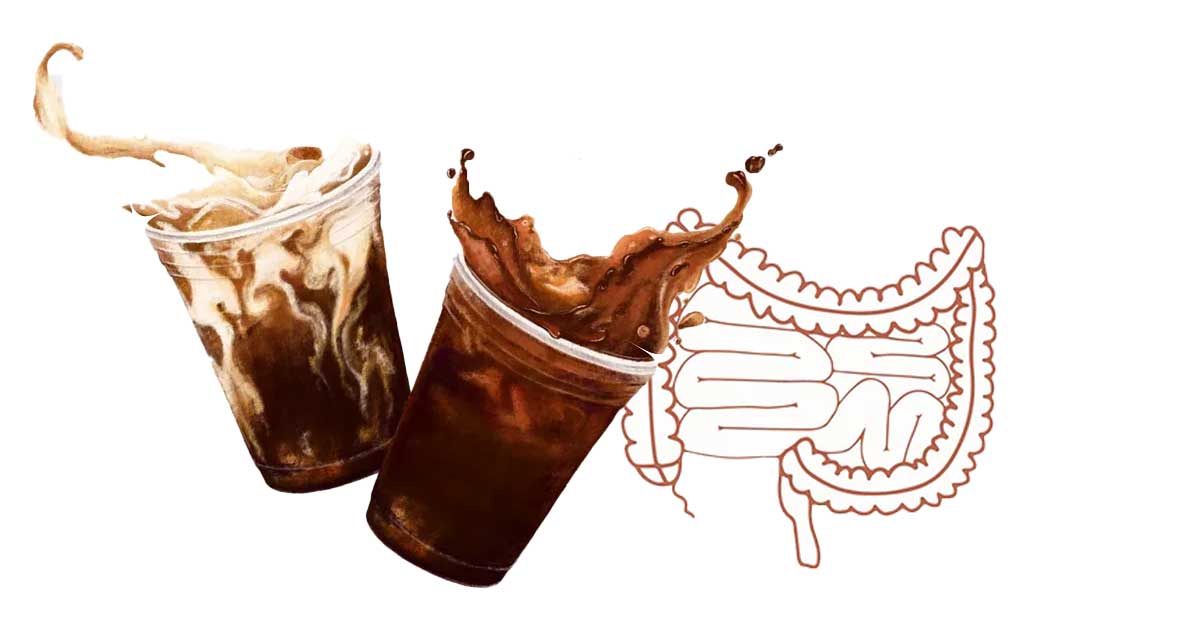If you’re an avid coffee drinker, then it’s likely that you’ve experienced the urge to go to the bathroom shortly after consuming your daily cup of coffee.
But have you ever wondered whether iced coffee or hot coffee can have a greater effect on your digestive system? This is a common question that many coffee lovers have and the answer might surprise you.
We will look at the science behind how coffee affects the digestive system, as well as some common misconceptions about coffee and its effects on poop. So, let’s dive in and find out whether iced coffee really does make you poop more than hot coffee.
Coffee’s effect on poop
When it comes to the relationship between coffee and poop, there are a few things to consider. Firstly, coffee contains caffeine, a stimulant that can have a laxative effect on the body.
Caffeine stimulates the muscles in the digestive system, which can cause things to move more quickly through the large intestine, resulting in a bowel movement.
Another factor to consider is the temperature of the coffee. While there is no scientific evidence to suggest that iced coffee has a greater laxative effect than hot coffee, some people may feel that their bowels move more quickly after consuming iced coffee.
Quicker Digestion of Iced Coffee Compared to Hot Coffee
Fact that iced coffee is often consumed more quickly than hot coffee, or because the colder temperature of the drink causes the muscles in the digestive system to contract and move more quickly.
It’s also worth noting that the effects of coffee on the digestive system can vary from person to person. Some people may find that they have a strong urge to go to the bathroom after drinking coffee, while others may not experience any changes at all.
This is because people have different tolerances to caffeine and the other compounds found in coffee.
Impact of Coffee on Bowel Movements
There is some evidence to suggest that coffee (both hot and cold) can have a laxative effect on the body, there is no definitive answer as to whether iced coffee makes you poop more than hot coffee.
Ultimately, the effect of coffee on your bowels will depend on a variety of factors, including your individual sensitivity to caffeine, the temperature of your drink, and your overall digestive health.
Why Does Coffee Make You Poop?
Coffee is a beloved beverage enjoyed by billions of people around the world. However, there is a common side effect that many coffee drinkers have experienced – the urge to use the bathroom. The question is, why does coffee make you poop?
The answer lies in the chemical compounds found in coffee. Coffee contains caffeine, a natural stimulant that activates the muscles in the digestive system.
When caffeine enters the body, it triggers the production of gastric acid and stimulates the colon, causing contractions in the lower intestines.
This causes the fecal matter to move more quickly through the digestive system, resulting in the urge to use the bathroom.
Role in Digestion and Bowel Function
In addition to caffeine, coffee also contains other compounds that can contribute to its laxative effects. Chlorogenic acid, a compound found in coffee, is known to increase the production of bile, a digestive fluid that helps break down fats.
This can also stimulate the digestive system and cause the urge to defecate.
It’s also important to note that not everyone experiences this effect from coffee. Some people are more sensitive to caffeine and other compounds in coffee than others, which can cause more pronounced digestive effects.
Affect Bowel Movements
Aside from diet and exercise, there are various other factors that can affect bowel movements. One of the most common factors is stress and anxiety.
When you’re under high levels of stress, your body releases hormones such as adrenaline and cortisol, which can cause your digestive system to slow down. This can then lead to constipation or irregular bowel movements.
Another factor that can affect your bowel movements is medication. Certain medications, such as opioids, anti-depressants, and iron supplements, can cause constipation as a side effect.
It’s important to speak with your healthcare provider if you’re experiencing irregular bowel movements as a result of medication.
Dehydration
Dehydration is also a common factor that can affect bowel movements. When the body is dehydrated, the colon absorbs more water from the stool, making it harder and more difficult to pass.
This can then lead to constipation. Make sure to drink plenty of water throughout the day to keep your body hydrated and your bowels moving smoothly.
In some cases, underlying health conditions such as irritable bowel syndrome (IBS), Crohn’s disease, and ulcerative colitis can also affect bowel movements.
These conditions can cause a range of symptoms including diarrhea, constipation, and abdominal pain. If you’re experiencing any of these symptoms, it’s important to speak with your healthcare provider for proper diagnosis and treatment.
Sleep Deprivation and Bowel Movements
Finally, lack of sleep or sleep disturbances can also affect bowel movements. Sleep deprivation can disrupt the body’s natural rhythms, including those that regulate bowel movements.
This can then cause irregular bowel movements or constipation. Make sure to prioritize getting enough quality sleep each night to allow your body to function properly.
In summary, factors that can affect bowel movements include stress, medication, dehydration, underlying health conditions, and lack of sleep.
By identifying and addressing these factors, you can help to promote healthy and regular bowel movements.
Conclusion
Firstly, we found that caffeine stimulates the gastrointestinal tract which can increase the need to pass stools. However, this effect is not exclusive to iced coffee, as hot coffee contains the same amount of caffeine.
We also discovered that some coffee beans are roasted for longer periods, which can create compounds that irritate the colon and lead to bowel movements.
The amount of caffeine in the drinks is the same, so the effects on the gastrointestinal tract will also be similar. Additionally, the roasting of the coffee beans plays a significant role in the digestive effects, and this is not altered by adding ice.
Call to Action
Now that you know more about how coffee affects your bowel movements, we’d love to hear from you! If you have any questions about the topic or would like to share your own experiences, please leave a comment below. Your input is invaluable to us and to our community.
Additionally, we encourage you to share this blog post on your social media accounts. By doing so, you can help others learn more about the effects of coffee on their digestive systems.

